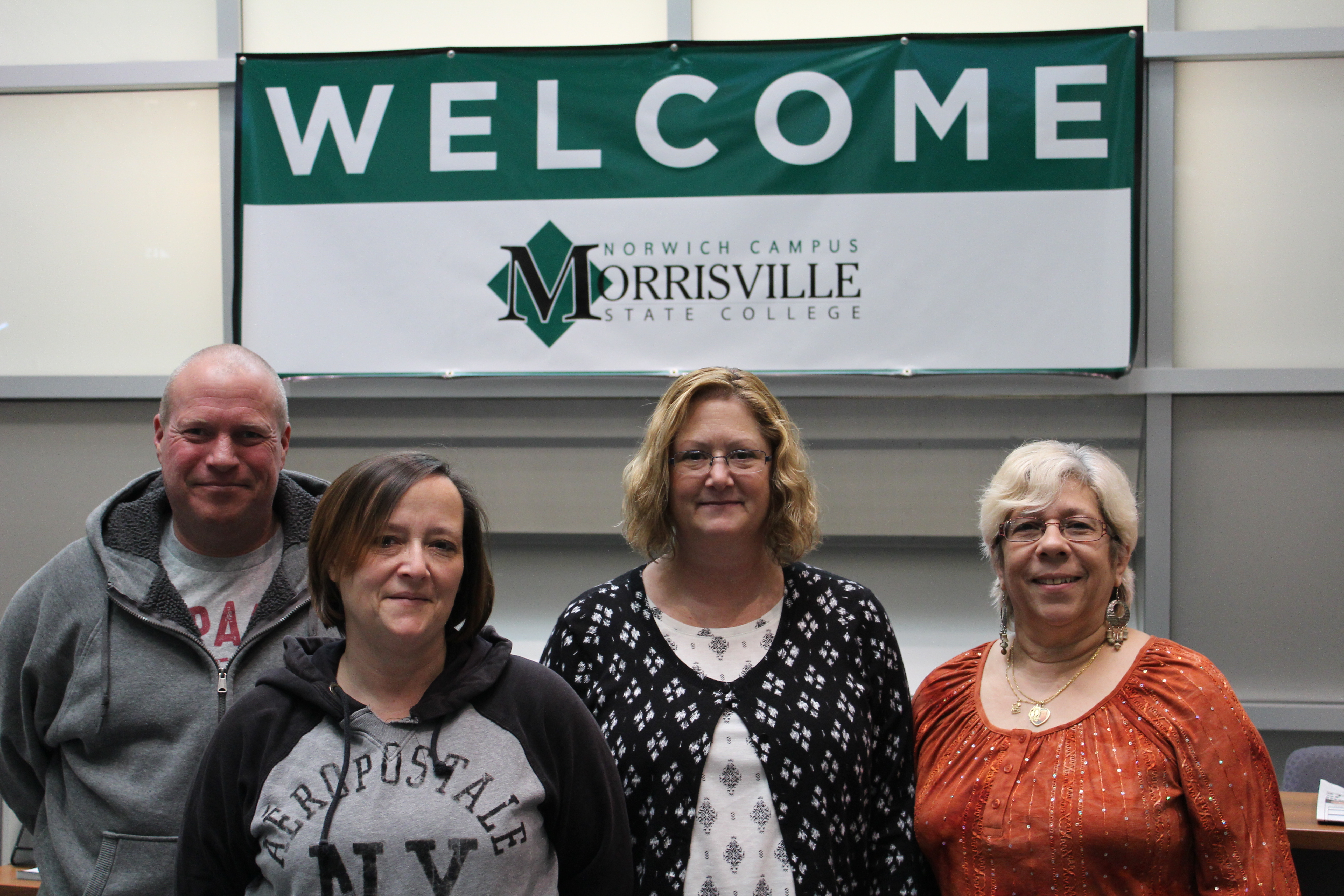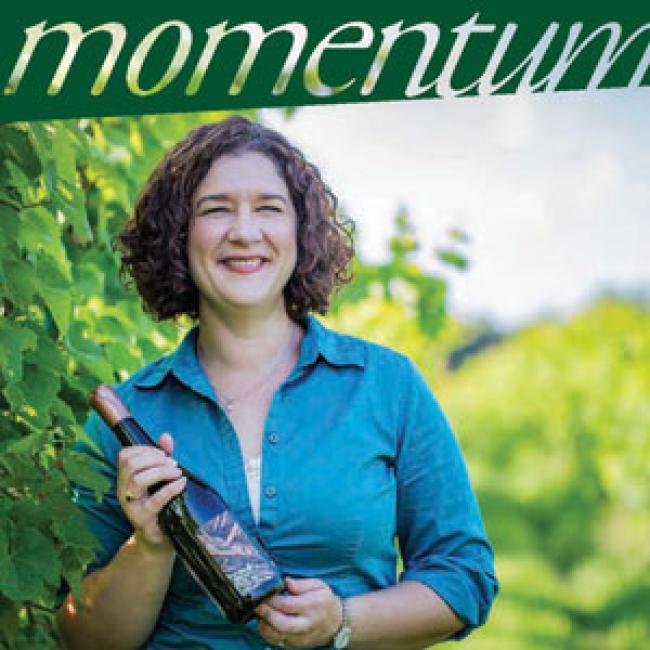The first time Christine Barta-Gallagher wrote a paper for a Morrisville State College class, she cried. “It was overwhelming,” she said. “It took me days to write that paper. For me to sit down and type 2,000 words was really difficult.”
The learning curve was difficult for Angel Towndrow, too. “Before I came here I had never sent an email,” she said. “I’ve had to learn Word and PowerPoint. I never learned to write papers. I had never heard of APA style.”
The two are among 13 former Norwich Aero workers pursuing associate degrees at MSC’s Norwich campus, about a half mile from their former employer. Norwich Aero, which made sensors and electrical subsystems for the aerospace industry, laid off about 125 people in 2015. Aero’s parent company, Esterline Corp., moved its manufacturing operations to Tijuana, Mexico.
The loss of well-paying jobs in Chenango County shocked the business community – not to mention the workers affected.
“I was going to stay there until I retired,” said Barta-Gallagher, who began working at Aero 35 years ago. “I had never been laid off before,” she said. “There’s not a lot of work around here.”
The layoffs spurred sadness over the loss of job and a community they loved, as well as panic about loss of income and future employment. As they considered their options, college emerged as a possibility for the former Aero employees. MSC participated in a job/college fair that Aero hosted for employees, and the local workforce agency provided the workers information about MSC’s Norwich campus if they were interested in college, said Lindsey Lefevre, admissions and community outreach coordinator.
The former Aero employees are attending MSC through the U.S. Department of Labor’s Trade Adjustment Assistance (TAA) Program, which provides training and education for workers who lose their jobs as a result of foreign trade. Rather than collect unemployment benefits while searching for new jobs, these former Aero employees go to school, preparing themselves for new careers.
Barta-Gallagher, who is 56 and has two adult children, decided to give the program a chance. “I had never been to college,” she said. “I knew I didn’t want to go back into factory work. I figured this was my chance to try something different.”
She’s now studying early childhood education and interns three hours a week at a preschool. “There’s a big need for child care around here,” she said.
Towndrow, 41, had worked at Aero for nine years and she “loved it.” Before landing a job at Aero, she had been unemployed for a year and wasn’t looking forward to repeating that stressful experience. With some trepidation, she enrolled in MSC’s computer information systems program.
The two students recently joined two more former colleagues – now classmates – in Roger W. Follett Hall’s sunny atrium to compare notes about their college experience.
Eric Lyons, an 11-year Army veteran who had worked 18 months at Aero, found starting college in his mid-40s more difficult than his earlier careers or military life. “It’s easier to have bullets fired at you than write a paper,” he said.
Lyons, who is studying computer information systems, recalls his first college writing assignment: a two-page personal narrative. “I thought, ‘What is that?’” he said. “I went from high school right to the military. I had no idea about that stuff.”
With his wife’s encouragement, Lyons completed that assignment in four hours. “Once I got going, it kind of came out,” he said. His grade? Eighty-six percent – a B+. Although Lyon is pleased with his grades, “It’s still hard.”
“I’m just now getting comfortable,” said Doreen Williams, 61, who is studying office administration. “Everything has changed so much. Everything is on computers. There’s so much to learn.”
Before starting classes, she also worried she would “be the ancient one” while the other students would be “younger and more intelligent.” The median age of the approximately 300 students at the Norwich campus is 27. Despite her fears, Williams finds the staff, faculty and students supportive. “Being with younger students turned out not to be a big deal,” she said.
Having a support group of former colleagues allows the students to commiserate and share successes. In addition to learning new material and mastering technology, they’ve had to develop time management skills. “I used to have a set schedule and knew what to expect,” Lyons said. “When you walked out the door, you were done with work. Now you’re still going for hours.”
Balancing schoolwork with family life also presents new challenges. “I’m still trying to figure it out – cleaning the house, cooking, studying,” Williams said.
“Clean house?” Barta-Gallagher said. “That’s not happening.”
Their families have been sympathetic and helpful. Barta-Gallagher’s husband brings her food while she’s studying, and Towndrow’s husband built her a desk. Lyons’ wife helps him with his schoolwork, and the whole family cheers him on.
Williams has experienced an interesting role reversal: Her son calls and asks about her homework and often talks her through how she might approach a writing assignment. The work is still challenging, but, “I learned I can do it if I put my mind to it,” she said. She’s taking pre-algebra and “it’s slowly sinking in. It feels good.”
Towndrow described college as “nerve-wracking and exciting.” She’s enjoying the challenges, and her success helps build confidence. “When I was in high school, I never made the honor roll,” she said. “Last semester I made Dean’s List.”
Taking college classes has “opened my mind up,” Lyons said. Last summer, he watched the presidential debates and discussed presidential election issues with his daughter. “I never would have done that before.” Thanks to a macroeconomics course, he “would watch CNN and know what they were talking about.”
All four are glad they took the risk. “I think you’d be surprised what you can do,” Towndrow said.
“If the opportunity comes up, go for it,” Williams said. “You’ll never have to say, What if?’”


